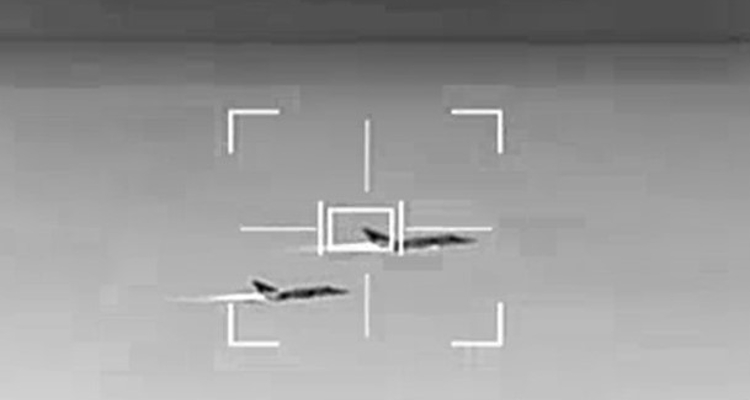How Russia’s War in Ukraine Affects Its Meddling in Africa
Russia is keeping the influence it has built up in the Central African Republic, Libya, Mali and Sudan.

Published by The Lawfare Institute
in Cooperation With

Editor’s Note: The Russian invasion of Ukraine has led to greater focus on Moscow's activities around the world. Working through private military companies, Russia has repeatedly intervened in Africa's civil wars, becoming a major power broker in several. John Lechner, formerly with the U.S. Commission on International Religious Freedom, and Jalel Harchaoui, a specialist on Libya, assess Russia's role in Libya, Sudan, the Central African Republic and Mali. They argue that these regimes are relying extensively on Russia and that U.S. and EU efforts to counter Moscow's influence are often half-hearted and unlikely to succeed.
Daniel Byman
***
At the end of March, Russian fighters assisted local government forces in central Mali as they besieged the town of Moura and executed approximately 300 people, drawing no distinction between innocent civilians and armed extremists. The massacre was a stark reminder that Moscow did not leave Africa after launching its invasion of Ukraine in February. In addition to Mali, Russia currently possesses a clandestine military presence in Libya, Sudan and the Central African Republic (CAR). All those missions continue, regardless of the redeployment of a modest number of Russian fighters and urban-warfare specialists from Libya to Ukraine.
Moscow’s approach to these countries often comes with horrendous human-rights violations, but is shrewd and tenacious. The United States, though, has shown little interest in implementing policies capable of thwarting Russian influence in Africa and defending civilians. The aggression in Ukraine and the Beltway’s resulting moral outrage against all things Russian have yet to produce an observable shift in U.S. policy in Africa.
Russia’s keen interest in Africa predates the Arab Uprisings of 2011. Those crises, at first a setback for Moscow, later provided it with an opportunity to assert itself in the Levant and North Africa. Unlike its full-blown military intervention in Syria since 2015, Russia has avoided overt action in Africa. Instead, it supports the deployment of private military companies (PMCs), whose organic links to the Kremlin are never acknowledged. The flexible—and nominally deniable—mix of private and government interests enables Kremlin-associated businessmen to implement the Russian state’s adventurism via profit-generating schemes. The financial income, although neither enormous nor reliable, makes the Russian state’s African strategies cheaper to pursue.
In response, U.S. policy has mainly consisted of condemning Russian activities in Africa, while usually eschewing tangible actions to challenge them. In some theaters, such as Libya and Sudan, this ambivalence is partly to do with close U.S. partners in the Middle East, such as the United Arab Emirates (UAE) and Egypt, who consider Russia’s presence in these countries desirable and lobby Washington for leniency. In other places, like CAR and Mali, Russian PMCs happen to stand opposite armed factions that are equally, if not more, dangerous in Washington’s view.
The formidable character of the recent U.S. economic sanctions has added further incentives for Russian entities already ingrained in African countries to hold onto their infrastructure. Russian forces in Africa now control and operate naval bases, airfields, military camps, an array of weapons systems and natural resource stakes including gold, diamond and other mines. Such assets were acquired partly in response to the sanctions that Washington imposed in retaliation to the 2014 annexation of Crimea, and their utility to Moscow has only increased as a result of this year’s Ukraine crisis.
A Dilemma in Libya
In early 2020, Russia and its rival Turkey overshadowed the Emirates as the most aggressive foreign meddlers in Libya. The oil-rich North African nation has not experienced sustained clashes since a peak in armed violence two years ago. Undergirding this lull is a tacit entente between Ankara and Moscow, both of which have used the relative calm to consolidate their respective military entrenchment. War between Libyan groups, along with their foreign sponsors, may resume this year amid the volatile stalemate between two competing claimants to the prime minister’s office in Tripoli.
One of the principal reasons why Russia built a military presence in Libya is its location on NATO’s southern flank. In 2014, months after it seized Crimea, Moscow began to slowly and surreptitiously render itself indispensable to a major Libyan faction, the armed coalition led by eastern-based commander Khalifa Haftar and his sons. Lately, an apparatus manned by hundreds of Russian personnel, in full control of several air bases and camps, has been instrumental in helping the Haftars maintain their security and retain their dominance over the country’s east and parts of its southwest. In addition to local interests, Russia also sees Libya as a logistics bridge into sub-Saharan Africa; earlier this year, the Russian Air Force used al-Khadim, an airbase near Benghazi, to ferry personnel and lethal equipment to Mali.
Recent phone interviews with Libyan eyewitnesses in several of the relevant areas contradicted early media claims about a large-scale pullout of Russian personnel. Despite some departures and tactical adjustments, Russians still occupy the four military bases that have been under their control since at least last year and maintain fighter aircraft in Libya. Moscow could still use that operational footprint to disrupt the nation’s strategic oil installations in a bid to push prices higher, or pursue other objectives to frustrate U.S. policy.
Yet, apart from periodic bouts of anti-Russian rhetoric, Washington has been hesitant to exert firm pressure on the Haftars, whose organizational, political, military and financial weaknesses are known in detail to Moscow. Although irretrievably dependent on Russia, the field marshal and his sons command the only viable security structure in Libya’s eastern province, the vast expanse adjacent to Egypt. Cairo therefore considers any challenge to this inextricable association between the Haftars and Moscow a destabilizing threat. Besides Egypt, the UAE and France have in effect been on the same side as Russia in the Libyan crisis, and Abu Dhabi went as far as to fund parts of Russia’s Libya operations in 2019 and 2020. Haftar’s faction has likely become directly indebted to its Russian interlocutors, too.
All of this explains the caution of U.S. policymakers in charge of the Libyan file, who have slightly ratcheted up their denunciations of Russian interference in Libya since the start of the intervention in Ukraine, but have remained eager to see Haftar’s armed coalition better assimilated into the country’s formal state institutions in Tripoli.
While the U.S. Congress has shown signs that it may toughen up its stance on the issue, the Biden administration’s inclination to avoid a full-on confrontation with the Russians in Libya is likely to prevail as long as the Haftar camp avoids escalation. Conversely, if Haftar undertakes an armed offensive in addition to the new oil blockade he instituted in April, Turkey—with help from the United States, Italy and Britain—may prop up a Libyan counteroffensive against both his and Russia’s brigades.
Deepening Ties with the Sudanese Junta
In 2017, Sudan’s then-president, Omar al-Bashir, offered Moscow a permanent naval base and gold-mining privileges, which brought the arrival of Russian PMCs. Sudan’s foreign policy had become particularly transactional in 2014, when it distanced itself from Iran to improve its relations with Arab Gulf monarchies. The following year, Bashir sent his Rapid Support Forces (RSF), a paramilitary organization, to fight Houthi rebels in Yemen as part of the intervention led by Saudi Arabia and the UAE.
Russian PMCs participated in Bashir’s attempt to suppress popular protests in 2018 and 2019, to no avail. But they developed a direct rapport with the regular army as well as one of Bashir’s proxies in Darfur—the RSF militia chief, Mohamed Hamdan Daglo, more commonly known as “Hemedti”—and were able to take advantage of these ties after Bashir’s ouster. Hemedti and the head of the Sudanese Armed Forces, Abdel Fattah al-Burhan, strengthened their own positions, ratified the port deal with the Kremlin and ramped up their business partnerships with Russian PMCs. Last October, Burhan and Hemedti removed the civilian prime minister and his administration from the government, further cementing their stranglehold over the state.
Washington responded to the putsch by suspending $700 million in aid that was desperately needed by the Sudanese population. The stand-alone penalty, amidst an intensifying economic crisis and food insecurity, is an indication that Washington lacks a comprehensive strategy and that its support for Sudan’s pro-democracy demonstrators is idle talk. Russia’s ascendency worries some U.S. officials, but the military junta’s authoritarian drive has carried on, with diplomatic backing from the UAE, Egypt and Saudi Arabia—not to mention Israel’s quiet blessing. Against that backdrop, recent expressions of U.S. concern augur neither actual support for its civilians’ democratic aspirations nor effective containment of Moscow’s influence.
Filling the Void in CAR
CAR—arguably the world’s least developed and poorest country—is not a U.S. foreign-policy interest. The nation of five million people is still struggling to emerge from the devastation of its 2013 civil war, which killed tens of thousands of citizens, displaced a third of the population and left the country’s territory in the hands of predatory armed groups. The crisis began when a violent takeover of Bangui, the capital, by a coalition of predominantly Muslim militias triggered equally violent reprisals by Christian and animist militias, with whom the overthrown president, François Bozizé, then became associated. After an international military intervention led by France, CAR’s former colonizer, and then a period of transition, Bozizé’s former subordinate, Faustin-Archange Touadéra, was elected president.
In 2016, pressure from the French public brought about Paris’ exit, and a U
In 2020, a rebellion instigated by former President Bozizé failed and a relapse into civil war was averted, in significant part owing to Russian PMCs’ and Rwanda’s support for Touadéra—a reality that Western humanitarians and government officials acknowledge in private.
Now, thanks to the brutal, often abusive assistance from Russian PMCs, CAR’s formal military controls most major towns. During recent fieldwork, many Central Africans expressed such fatigue with the country’s long-term disorder and resentment toward rebel militias that they favor the restoration of territorial integrity by the Bangui government, even if it receives Russian PMC support.
Last year, France postponed its usual budgetary aid to CAR, citing concerns over Russian mercenary groups’ growing influence. This and other punitive measures, by financially strangling Bangui, only push it further into Moscow’s embrace, strengthen the hand of armed groups and add to civilian suffering. If other international donors fail to provide relief aid—a prospect rendered more probable by Russia’s war on Ukraine—CAR will experience an acute fiscal crisis. And the ensuing state fragility, far from Washington’s radar screen, may bring back the bloodiest days of the 2013 civil war.
Recent press reports of Russian departures from CAR were not borne out by Central African sources contacted by one of the authors. If Russian PMCs were indeed to leave, with no other foreign reinforcements filling the void, civilians would likely suffer more than in their current predicament. Despite the numerous crimes committed by the Russians in CAR, their presence still contributes to stability by preventing rebel armed groups from exacting collective revenge and causing mass displacement. Growing indifference to the country from the United States and its European partners explains part of this tragic dilemma.
France’s Withdrawal from Mali Makes Way for Russia
Russian mercenaries began arriving in Mali in late 2021 in support of Col. Assimi Goïta’s military regime and concomitantly with France’s withdrawal after its almost decade-long intervention against jihadist groups.
The French’s narrow yet critical cooperation with Tuareg separatists fueled local cynicism, as did their deliberate choice to prioritize radical Islamist threats over communal violence. In the end, Goïta’s second coup last year and his government’s relentless exploitation of popular anti-French sentiment led to Paris’ acrimonious exit.
Though there are now more than 1,000 Russian mercenaries deployed in Mali, they will be less effective than the French against jihadi groups and unable or unwilling to solve the security issues resulting from France’s failed intervention. This drastic downgrade could prove a problem for the United States, which has grown accustomed to relying on Paris for containing local franchises of al-Qaeda and the Islamic State. But for now, the United States, France and other Western nations have chosen to slash military aid, new development projects and direct budgetary support in response to the Goïta regime’s rejection of elections and its nascent ties to Moscow.
The massacre in the village of Moura made Western engagement with the Bamako government even more difficult. But a strategy of isolating and spurning Mali will neither diminish Russia’s influence nor prevent similar government atrocities from becoming more systematic; instead, it will weaken the ability of the United States and its partners, mainly France, to achieve their policy goals in the rest of the Sahel.
Washington Should Resist the Path of Least Resistance
Despite the considerable death toll that the Russians have incurred so far in Ukraine, they have not given up on their political levers, business interests and military assets in Africa. In the foreseeable future, Moscow may clinch security deals with more African governments. If Africa is a genuine concern for Washington, policymakers must devise a more coherent, circumspect, and engaged policy for the continent, with an eye to addressing the root causes that led to Russia’s military presence.
Punishing poor African governments, like those of CAR or Mali, for their Russian connections by reducing U.S. and European aid will not alter their behavior or protect civilians. It will only amplify Russian influence and erase U.S. leverage, while bringing further harm to populations already in the grips of a severe food crisis caused in large part by Russia’s war on Ukraine. The United States should avoid this type of overreaction given that security deterioration in those territories, along with the growth of actors more toxic than the Russians, might well force the United States to come back asking for cooperation from the same local authorities in the medium-term future.
In Sudan, the politicians aligned with Russia also receive the support of Egypt and the Emirates, two Arab bellwethers with sway in Washington. Though the United States might prefer local partners that share its priorities and values, these countries’ governments are unabashedly focused on regime security, even if it means the loss of U.S. and European aid. Thus, Washington should demand more transparency and accountability with regards to Russia from its Middle East partners—especially Cairo, whose tight coordination with Moscow is often underestimated.
The Emirates and Egypt have played a pro-Russia role in Libya, too, but there the United States has greater interests owing to the theater’s geographic proximity to Europe. Russia’s war on Ukraine has made the ground shakier for its main Libyan host, Field Marshal Haftar, who can no longer attempt violent moves similar to his past campaigns without exposing his entire coalition to existential risks. But if he shows self-restraint and if the Russians avoid drawing too much attention, the United States may stick to its usual instinct of de facto tolerance. That is all Moscow needs to continue making headway.






